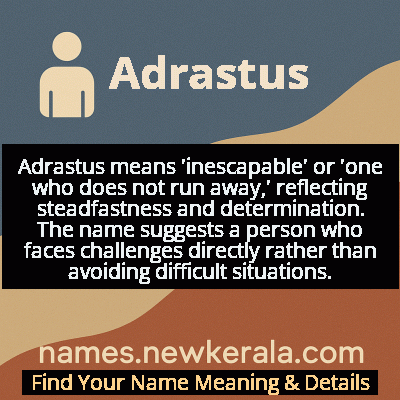Adrastus Name Meaning & Details
Origin, Popularity, Numerology Analysis & Name Meaning of Adrastus
Discover the origin, meaning, and cultural significance of the name ADRASTUS. Delve into its historical roots and explore the lasting impact it has had on communities and traditions.
Name
Adrastus
Gender
Male
Origin
Greek
Lucky Number
4
Meaning of the Name - Adrastus
Adrastus means 'inescapable' or 'one who does not run away,' reflecting steadfastness and determination. The name suggests a person who faces challenges directly rather than avoiding difficult situations.
Adrastus - Complete Numerology Analysis
Your Numerology Number
Based on Pythagorean Numerology System
Ruling Planet
Uranus (Rahu)
Positive Nature
Strong sense of order, loyal, practical, and disciplined.
Negative Traits
Stubborn, overly serious, rigid, and prone to feeling restricted.
Lucky Colours
Blue, gray.
Lucky Days
Saturday.
Lucky Stones
Blue sapphire.
Harmony Numbers
1, 7, 8.
Best Suited Professions
Managers, engineers, accountants, organizers.
What People Like About You
Dependability, discipline, practicality.
Famous People Named Adrastus
Adrastus of Argos
Mythological King
Led the Seven Against Thebes expedition in Greek mythology
Adrastus of Cyzicus
Historian
Authored historical works on Pythagorean philosophy
Adrastus of Aphrodisias
Philosopher
Wrote influential commentaries on Aristotle's works
Name Variations & International Equivalents
Click on blue names to explore their detailed meanings. Gray names with will be available soon.
Cultural & Historical Significance
Extended Personality Analysis
The name Adrastus evokes personality traits of determination, resilience, and principled leadership, directly reflecting the mythological king's character. Those bearing this name are often perceived as steadfast individuals who face challenges with courage and refuse to abandon their commitments, even under dire circumstances. They typically possess strong organizational abilities and strategic thinking, capable of mobilizing resources and people toward common goals. However, this determination can sometimes border on stubbornness, as they may persist with plans even when evidence suggests alternative approaches would be wiser. Their leadership style tends to be protective and duty-bound, with deep loyalty to family and allies that can cloud their judgment in personal matters. The mythological Adrastus' complex nature—both a noble leader and a figure who presided over disaster—suggests that modern bearers of the name might struggle with balancing idealism against practical realities, and may carry the weight of responsibility with particular intensity.
Modern Usage & Popularity
In contemporary naming practices, Adrastus remains an exceptionally rare choice, primarily selected by parents with strong interests in classical studies, mythology, or those seeking a distinctive name with deep historical roots. Its usage is most common in Greece and among Greek diaspora communities, though even there it appears infrequently. The name has never ranked in popular name charts in English-speaking countries, maintaining its status as an academic or literary choice rather than a mainstream one. In recent decades, there has been a minor resurgence of interest in ancient Greek names, which has brought occasional renewed attention to Adrastus, though it remains far less common than names like Alexander or Theodore. The name's association with tragic mythology may deter some parents, while others appreciate its historical weight and distinctive sound. It's primarily encountered in academic contexts, historical fiction, or among families with particular connections to classical traditions.
Symbolic & Spiritual Meanings
Symbolically, Adrastus represents the inescapable nature of fate and the human capacity to confront destiny with dignity. The name's etymological meaning of 'not running away' embodies the concept of facing inevitable challenges with courage rather than avoidance. It symbolizes the complex relationship between leadership and tragedy, as the mythological Adrastus successfully organized a military campaign but witnessed its catastrophic failure. The name carries connotations of resilience—being the sole survivor of the Seven Against Thebes suggests an ability to endure when others cannot, but also the psychological burden that such survival imposes. Adrastus also represents the tension between personal loyalty and larger responsibilities, as his campaign was motivated by family obligations that had wider political consequences. The symbolic weight includes themes of kingship, the morality of warfare, the limits of human planning against divine will, and the enduring impact of memory and storytelling in shaping historical legacy.

